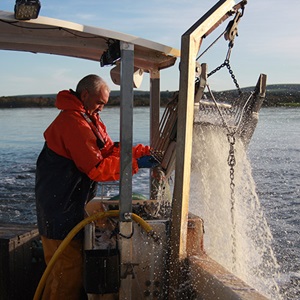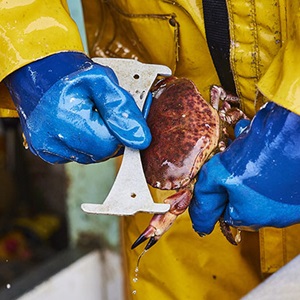What are krill?
Krill are small, shrimp-like crustaceans that typically grow to about 6cm long. They move in dense swarms and feed on tiny phytoplankton.There are over 80 species of krill in the oceans but the most well-known and commercially important is Antarctic krill (Euphausia superba).
Antarctic krill sometimes form super swarms, so large they can be seen from space. With an estimated biomass of around 300 million tonnes in the Southern Ocean, krill are among the most abundant animals on earth.
Why are krill important?
Krill are vital to the Antarctic food chain as the main prey of many animals including three species of whales, seven species of penguins, five species of seals, and numerous finfish, squids, albatrosses and other flying seabirds. As such, scientists have designated krill as ‘keystone’ species.Krill are also key-players in blue carbon processes – the trapping and storing of carbon in the ocean - which help mitigate climate change. By eating enormous amounts of phytoplankton, krill trap carbon in their bodies. When whales eat krill, the carbon and iron-rich waste fertilises more phytoplankton, while sinking “poo pellets” trap carbon deep on the ocean floor.
Therefore, despite the abundance of krill, it is crucial that krill fishing is rigorously managed and sustainable. If we remove too many krill from the ecosystem, the system could collapse.
Why do we fish krill?
Krill are rich in Omega-3 fats and the naturally occurring antioxidant Astaxanthin. To extract these for human benefit, krill are processed to form oil used in nutritional supplements. Krill meal and oil are also used in aquaculture and animal feed.
How is krill fishing managed?
Fishing in the Antarctic is governed by the Commission for the Conservation of Antarctic Marine Living Resources (CCAMLR), which was established in 1982 to conserve Antarctic marine life and prevent the unregulated expansion of krill fishing in the Southern Ocean.Its international Convention on the Conservation of Antarctic Marine Living Resources has been agreed to by CCAMLR’s 27 members, plus a further 10 countries. Currently, only six members (Chile, China, South Korea, Norway, the Russian Federation and Ukraine) engage in krill fishing.
CCAMLR is widely recognised as leading and developing best practice for fisheries management worldwideand takes a cautious approach to fishery management. Through consensus agreement of all members, CCAMLR confines commercial krill fishing to tightly monitored designated areas around the Antarctic Peninsula. Annual stock assessments to ensure krill abundance are conducted by CCAMLR scientists.
To prevent overfishing, CCAMLR sets a precautionary ‘Trigger Level’ catch limit on krill fisheries. This Trigger Level is approximately 1% (~ 620,000 tonnes) of the krill biomass in the designated area and ensures the estimated needs of the krill’s predators are met.
The total annual krill catch has been increasing however and in August 2025 the krill fishery reached the Trigger Level catch limit for the first time. The fishery was closed immediately and will not be reopened until the next fishing season.
How does the MSC ensure krill is sustainable?
Fisheries certified to the MSC Fisheries Standard, must meet its three principles - a science-based set of requirements for sustainable fishing.
The three
principles demand:
- Stocks are abundant and self-sustaining,
- Fisheries minimise their impact on other species, habitats and ecosystems,
- Fisheries are under effective management.
Like CCAMLR, the MSC Fisheries Standard has more precautionary catch limits for keystone species than for other commercial species. This requirement ensures not just the abundance of the stock but also whether the stock status has impacts on predator
and ecosystem needs.
Antarctic krill fisheries certified to the MSC Fisheries Standard undergo stringent management through independent assessment, evaluation, and monitoring. Assessments to the Standard are carried out annually by
accredited, independent certifiers and stakeholder input is welcomed throughout the assessment process.
Currently krill fishing vessels from Norway, Chile and South Korea are certified as sustainable to the MSC Fisheries Standard
and are in full compliance with MSC and CCAMLR (fisheries management) regulations.
These certified fisheries demonstrate a strong commitment to sustainability by investing in scientific research, gear innovation, and international
cooperation under the Antarctic governance structure.
Does krill fishing threaten Antarctic wildlife?
CCAMLR and the MSC’s ecosystem-based management approach safeguards biodiversity and ensures ecosystem stability.MSC certified krill fisheries must provide independent and verifiable scientific evidence that they are minimising their impacts on biodiversity, habitats, and the ecosystem. Fishing must not cause serious or irreversible harm to the populations of any species e.g. whales, penguins and sea birds.
If fishing-related mortalities occur, the MSC requires evidence showing the population of the affected species is not suffering permanent harm, and its recovery to favourable conservation status is not being hindered.
The evidence must have a very high degree of certainty (i.e. 95th percentile probability), must be obtained through a population census from the last five years and be publicly available for scrutiny.
Independent onboard observers monitor all interactions with wildlife and non-target species. Since 2020 CCAMLR has required 100% observer coverage of all fishing vessels and scientific observer reports are publicly available through CCAMLR to ensure transparency.
What are krill fisheries doing to improve environmental performance?
Some MSC certificate holders are members of the Association of Responsible Krill harvesting companies (ARK), formed in 2012, by eight krill fishing companies from Norway, the Republic of South Korea, Chile, and China.
In addition to adhering to CCAMLR and MSC requirements, ARK members implement voluntary measures to further protect Antarctic wildlife.
Protecting penguins
While most Antarctic waters are Marine Protected Areas, strictly controlled fishing is allowed by CCAMLR around the Antarctic Peninsula, known as Area 48. The sea ice in Area 48 is where krill spawn and where chinstrap penguins feed. However, the penguin populations are in decline.
Recent research has found the chinstrap penguins’ decline in numbers is due to numerous factors. Rebounding humpback whale populations, climate change causing a reduction in sea-ice, and concentrated fishing in Area 48 have increased the competition for krill, affecting the penguins’ ability to forage and breed. These combined effects are known as ‘localised depletion’.
Changes to the fishing zones might include ‘move on’ rules to prevent this localised depletion, but without consensus agreement by all CCAMLR member nations, concentrated fishing in Area 48 is still permitted.
To safeguard penguin populations during the breeding season and ahead of CCAMLR-mandated measures, ARK members have established self-imposed no-fishing zones.
The voluntary no fishing zone is 4,500 km2 – three times the area of Greater London. This buffer zone encompasses the foraging and chick-rearing areas for over 74% of chinstrap, almost 98% of Gentoo, and above 91% of Adélie penguin colonies, offering significant protection to most penguins around krill fisheries.
Protecting marine mammals
To prevent whales, seals and other marine mammals from being accidentally entangled in fishing nets, some ARK member vessels have implemented exclusion devices which should keep larger marine animals out while still allowing krill in. However, following recent humpback whale mortalities, research is now underway to further improve the devices to safeguard whales and CCAMLR is being petitioned to ensure the devices are fitted to all krill fishing vessels.
Some ARK members also use eco-harvesting techniques that keep fishing nets underwater for longer to reduce energy consumption. These techniques avoid repeated casting and retrieval of fishing gear lessening unintentional and adverse interactions with birds.
Krill fisheries use sonar and echo-sounders to locate krill but certified fishery and ARK member, Aker QRILL Company, has invested heavily in more state-of-the-art technology e.g., using SailBuoy a small, non-invasive, solar-powered surface drone and an ocean drone for krill data collection. The drones are key for locating krill but also provide data that is shared with CCAMLR to improve scientific knowledge on krill biomass.
Overall, because of CCAMLR, the MSC and ARK management systems, Antarctic krill fisheries operating within all three programs, rate among the most environmentally sustainable and well-regulated fishing operations on the planet.



